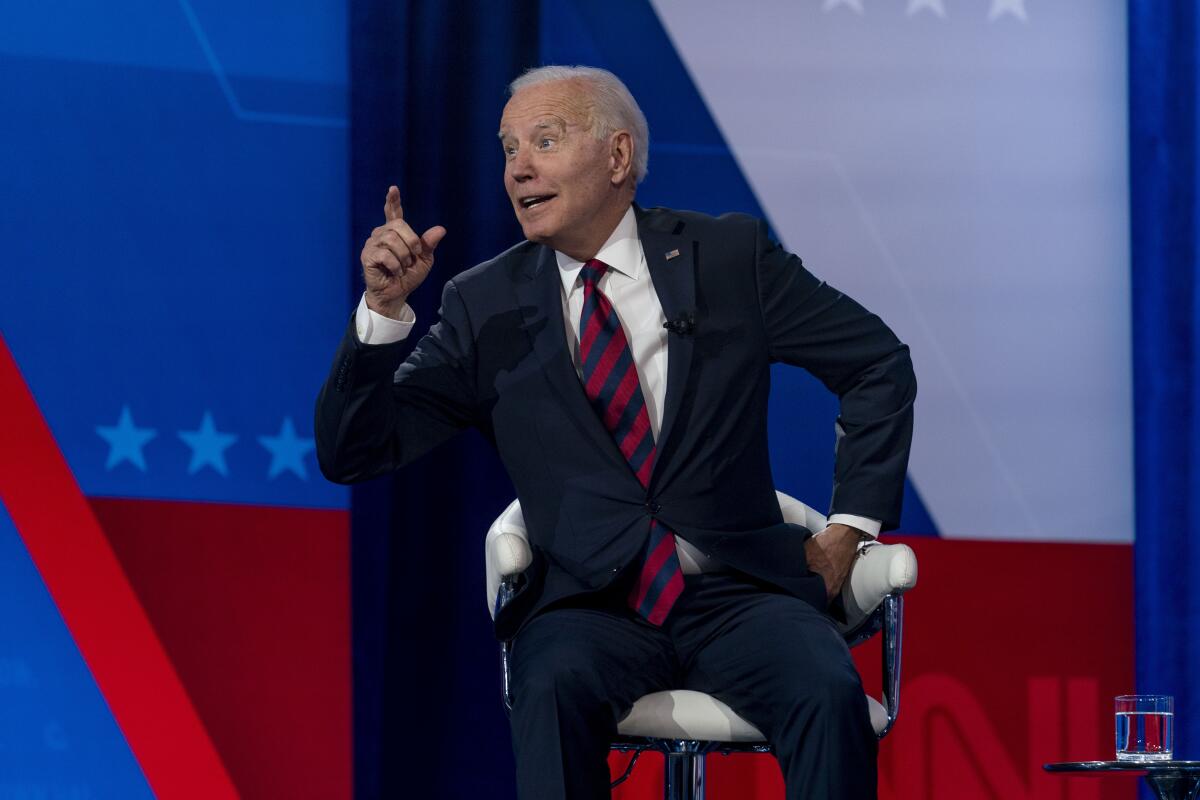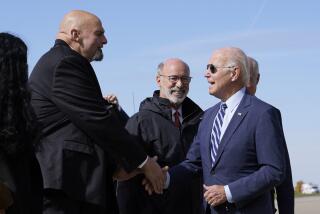Biden makes prime-time pitch for infrastructure, but Ohioans press on voting rights and more

President Biden traveled to Ohio to pitch his infrastructure plan Wednesday evening. But throughout a prime-time televised town hall, he at times found himself on the defensive about rising numbers of coronavirus cases and his opposition to abandoning the Senate’s filibuster to pass voting rights legislation.
The town hall, held by CNN in Cincinnati and moderated by anchor Don Lemon, came at pivotal moment for Biden. His bipartisan infrastructure deal with a group of Republican senators has been bogged down as lawmakers haggle over the details of legislation to build and repair roads, bridges and water systems, expand broadband access and more, and how to pay for it all. His progress in the fight against the pandemic is threatened by the more contagious Delta variant of the coronavirus.
Asked about the recent resurgence in infections under his watch, Biden pivoted to promoting vaccinations. “It’s real simple,” he said. “We have a pandemic for those who haven’t gotten a vaccination. It’s that basic.”
Federal health officials could soon determine that vaccines should be available to children younger than 12, the president said, but until then they should wear masks when classes resume. Biden also continued to walk back comments he made last week that social media such as Facebook were “killing people.” Biden said his comment was targeted toward the few people most responsible for spreading misinformation on the online sites.
“That misinformation is going to kill people,” he said. “Not a joke. Not a joke.”
Biden faced questions about his unwillingness to support ending the Senate filibuster, which many Democrats describe as an obstacle to passing voting rights legislation. Though Biden described Republican efforts to restrict ballot access as “Jim Crow on steroids” and an attack on democracy, as he has before, he also reiterated that he’d only support modifying the filibuster to make it harder to sustain, not to end it.
If Senate Democrats try to end it, he said, “you’re going to throw the entire Congress into chaos and nothing will get done. Nothing at all will get done. And there’s a lot at stake.”
When Lemon emphatically suggested Democrats couldn’t pass legislation without ending the filibuster, Biden replied, “I don’t believe that. We’re going to get it done.”
Biden’s efforts at bipartisanship could be closer to bearing fruit in negotiations over infrastructure, and he repeatedly said he thinks Congress will pass legislation.
In the network appearance, Biden touted the economic impact of the $1.9-trillion pandemic relief package he signed into law in March and addressed questions about his two-part infrastructure plans, consisting of the roughly $600-billion bipartisan proposal and a $3.5-trillion, multiyear budget blueprint covering other domestic initiatives that Republicans don’t support — including programs to assist working families, expand Medicare and promote green energy projects.
The town hall took place not far from the aging Brent Spence Bridge, which crosses the Ohio River into Kentucky and is a major artery for interstate truck transportation. As a questioner noted, former Presidents Trump and Obama each had used the bridge, which carries far more traffic than it was designed for, as a backdrop for their own calls for infrastructure spending. Biden said upgrading the span would get done if the legislation he’s proposed passes.
“Fix that damn bridge of yours going into Kentucky,” Biden said to applause.
While Biden spoke with Ohioans, congressional negotiators continued work on the bipartisan infrastructure legislation, which will need at least 10 Republican votes to pass in the Senate. Democrats there separately plan to move the second, broader package under a special budget procedure that could not be blocked by a Republican filibuster and would require no GOP votes if all 50 Democrats support the legislation — a prospect still in doubt.
Senate Republicans on Wednesday blocked a motion from Senate Majority Leader Charles E. Schumer (D-N.Y.) to begin debate on the infrastructure plan even as negotiators continued to write the bill. Legislators say the plan is still on track, and Sen. Rob Portman of Ohio, one of the GOP negotiators, said Republicans would commit to starting debate early next week.
Immigration is another area where the Biden administration has struggled, amid an influx of people seeking to cross the southern border. Biden said he would keep fighting for young immigrants known as Dreamers who were brought to the country illegally as children. A federal judge in Texas last week ruled that the Obama-era program known as DACA was unconstitutional and barred the federal government from accepting new applicants.
“I’m not letting this go,” Biden said.
The visit was Biden’s third trip to Ohio, a presidential battleground state that leans Republican, since taking office. Roughly 49% of the state’s population has received at least one dose of a COVID-19 vaccine. Although its caseload is far lower than during the peak of the pandemic in January, the state saw a spike of nearly 750 new cases Tuesday.
The president defended his economic agenda to create jobs in response to a question from a Republican woman who worried that inflation would continue to rise. He said Wall Street experts have assured him that higher inflation is temporary, reflecting consumers’ demand for materials in short supply, and should subside as the American economy continues to rebound from the pandemic shutdowns.
He also mentioned his executive order in July on promoting competition, which introduced new initiatives for federal agencies. “All of sudden, people are having choices,” Biden said. “Companies should have to compete for workers. Guess what, maybe they’ll pay more money.”
More to Read
Get the L.A. Times Politics newsletter
Deeply reported insights into legislation, politics and policy from Sacramento, Washington and beyond. In your inbox three times per week.
You may occasionally receive promotional content from the Los Angeles Times.








